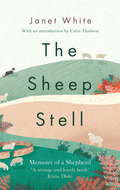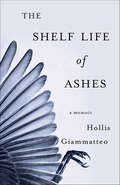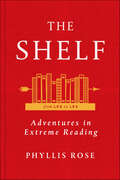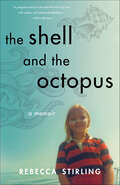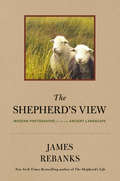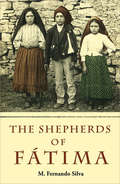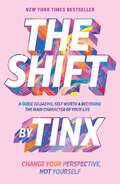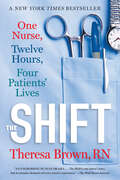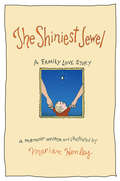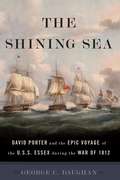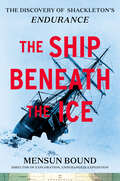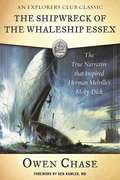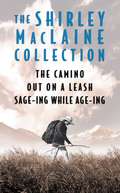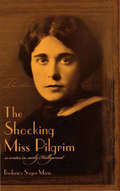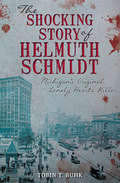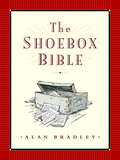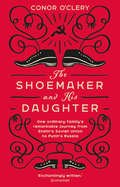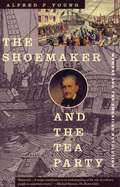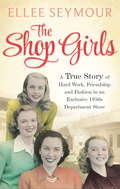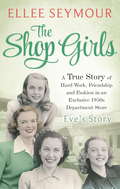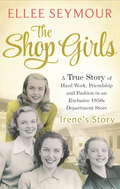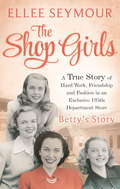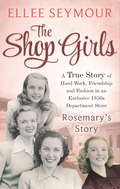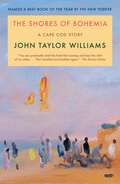- Table View
- List View
The Sheep Stell: Memoirs of a Shepherd
by Janet White'One woman's gloriously lyrical account of life and love as a shepherdess' Mail on Sunday'Janet White's unfailingly enjoyable book . . . taps into a widespread feeling that we have become cut off from the natural world' TLS'An immensely enjoyable and heartfelt book: it makes you want to run for the hills' The LadyWith an introduction by Colin ThubronAs a child in wartime England, Janet White decided that she wanted to live somewhere wild and supremely beautiful, to inhabit and work the landscape. She imagined searching the whole world for a place, high and remote as a sheep stell, quiet as a monastery, challenging and virginal, untouched and unknown. Turning her back on convention, Janet's desire to carve out her own pastoral Eden has taken her from the Cheviot Hills to Sussex and Somerset, via the savage beauty of rural New Zealand. The Sheep Stell tells the tale of a woman before her time; a woman with incredible courage and determination, truly devoted to the land and its creatures. Evocative, unaffected and profound, it is a lost classic.'A book to share or even fight over if necessary' Rosamund Young, author of The Secret Life of Cows'An extraordinary memoir . . . The Sheep Stell is pure joy, one of the most moving books I've read in a long time' Philip Marsden, author of Rising Ground 'This is a strange and lovely book, and quiet as it is, it makes you gasp at the profoundly lived quality of the life it so modestly describes' Jenny Diski'A hymn to country solitude, lyrical, unpretentious and deeply felt' Colin Thubron
The Shelf Life of Ashes: A Memoir
by Hollis GiammatteoWhen Hollis Giammatteo sought a job working with the elderly, she did so with the intention of finding models of healthy aging. And she failed. In The Shelf Life of Ashes, Giammatteo chronicles her experiences with her wards, as well as the trip she embarks upon when her mother, who is convinced she is dying, entreats her to come “home.” Trips back, traumas triggered, identity in crisis, equanimity gained—this quasi-comic, concentrated journey engages the reader in the process of naming and facing the tasks involved in growing old, while asking a simple but weighted question: Can aging be done well?
The Shelf: From LEQ to LES: Adventures in Extreme Reading
by Phyllis Rose“Exhilarating, adventurous, original . . . The Shelf is a reminder of what reading and writing are all about.” —Azar Nafisi,#1 New York Times–bestselling author of Reading Lolita in TehranAfter a career of reading from syllabuses and writing about canonical books, Phyllis Rose decided to read like an explorer. Casting herself into the untracked wilderness of the New York Society Library's stacks, she chose a shelf of fiction almost at random and read her way through it.What results is a spirited experiment in “Off-Road or Extreme Reading.” Rose's shelf of roughly thirty books has everything she could wish for—a remarkable variety of authors and a range of literary ambitions and styles. The early-nineteenth-century Russian classic A Hero of Our Time by Mikhail Lermontov is spine by spine with The Phantom of the Opera by Gaston Leroux. Stories of French Canadian farmers sit beside tales about aristocratic Austrians. California detective novels and a novel from an Afrikaans writer who fascinates Rose to the extent that she ends up watching a YouTube video of his funeral.A joyous testament to the thrill of engagement with books high and low, The Shelf leaves us with the feeling that there are treasures to be found on every library or bookstore shelf.“Simple but radical.” —Chicago Tribune“Rose is consistently generous, knowledgeable, and chatty, with a knack for connecting specific incidents to large social trends.” —The New Yorker“Immensely appealing . . . . teaches us much about how to approach life as it does about how to read books.” — Boston Globe“Readers of The Shelf will feel befriended.” —The New York Times“Rose rallies readers to affirm our love of literature and libraries.” —Booklist (starred review)
The Shell and the Octopus: A Memoir
by Rebecca StirlingThis is the story of Rebecca Stirling’s childhood: a young girl raised by the sea, by men, and by literature. Circumnavigating the world on a thirty-foot sailboat, the Stirlings spend weeks at a time on the open ocean, surviving storms and visiting uncharted islands and villages. Ushered through her young life by a father who loves adventure, women, and extremes, Rebecca befriends “working girls” in the ports they visit (as they are often the only other females present in the bars that they end up in) and, on the boat, falls in love with her crewmate and learns to live like the men around her. But her driven nature and the role models in the books she reads make her determined to be a lady, continue her education, begin a career, live in a real home, and begin a family of her own. Once she finally gets away from the boat and her dad and sets to work upon making her own dream a reality, however, Rebecca begins to realize life is not what she thought it would be—and when her father dies in a tragic accident, she must return to her old life to sift through the mess and magic he has left behind.
The Shepherd's Life
by James RebanksA major new talent redefines the literature of rural life. Old world met new when a shepherd in the English Lake District impulsively started a Twitter account. A routine cell phone upgrade left author James Rebanks with a pretty decent camera and a pre-loaded Twitter app--the tools to share his way of life with the world. And what began as a tentative experiment became an international phenomenon.James has worked the land for years, as did his father, and his father before him. His family has lived and farmed in the Lake District of Northern England as long as there have been written records (since 1420) and possibly much longer. And while the land itself has inspired great poets and authors we have rarely heard from the people who tend it. One Twitter account has changed all that, and now James Rebanks has broken free of the 140-character limit and produced "the book I have wanted to write my whole life." The Shepherd's Life is a memoir about growing up amidst a magical, storied landscape, of coming of age in the 1980s and 1990s among hills that seem timeless, and yet suffused with history. Broken into the four seasons, the book chronicles the author's daily experiences at work with his flock and brings alive his family and their ancient way of life, which at times can seem irreconcilable with the modern world. An astonishing original work, The Shepherd's Life is an intimate look from inside a seemingly ordinary life, one that celebrates the meaning of place, the ties of family to the land around them, and the beauty of the past. It is the untold story of the Lake District, of a people who exist and endure out of sight in the midst of the most iconic literary landscape in the world.From the Hardcover edition.
The Shepherd's View: Modern Photographs From an Ancient Landscape
by James RebanksFrom The New York Times bestselling author of The Shepherd's Life, a breathtaking book of photography and wisdom that chronicles an ancient way of living that deeply resonates in our modern world. With over eighty full color photographs The English Lake District comes into full focus: the sheep competitions of the spring, the sweeping pastures of the summer, beloved sheep dogs in the fall and the harsh snows of winter. A celebration of a way of life still very much alive, The Shepherd's View is a poetic, and artistic achievement from one of England's most celebrated new voices.
The Shepherds of Fatima
by M. Fernando SilvaDrawing from historical sources and eye-witness accounts, Shepherds of Fátima is a captivating retelling of Mary's apparitions at Fátima, Portugal, in 1917. Fr. Silva leads readers through the lives of the three little shepherds--Lucia dos Santos and her cousins, Blessed Jacinta Martos and Blessed Francisco Martos--and the events at Fátima with skillful storytelling and expertise. This well-researched account reads like a novel and includes photos.
The Shift: Change Your Perspective, Not Yourself
by TinxAuthor of Hotter in the Hamptons, lifestyle creator, advice expert, and host of the It&’s Me, Tinx podcast shares her hilarious and (sometimes brutally) honest wisdom on how to shift your approach to life, step into your confidence, and enjoy the journey.It&’s time to get laser-focused on what makes us feel happy and fulfilled. Tinx wants to take your hand and guide you to a new way of thinking about life, love, happiness, and friendships—where dating evolves into an era of self-discovery and not just a means to an end, sharing wisdom becomes a collective power, and chaos turns into a source of creativity. Making small but mighty shifts in thinking can be a tool for personal growth that fuels you instead of fatigues you. The point is to know yourself, discover what fulfills you, and have fun along the way. In The Shift, Tinx collects all her revolutionary theories and hilarious personal anecdotes in one place, presenting you with a guide to simple mindset shifts that will completely change the way you approach decision-making and relationships. Through her own stories, from the good to the bad, Tinx helps you better understand how to step into your power and own self-worth. Some say you cannot love another before you learn to love yourself: Tinx teaches you how to do both at the same time. And she does it while making you laugh out loud. With her signature wit and candor, Tinx shows you: -How to change your scarcity mindset -How to understand and employ her famous Box Theory dating concept -How to feed the things that fulfill you -How living well is the best revenge -How therapy can reframe struggles into strengths -How to break up with dignity -How knowing your worth makes you a better friend and partner
The Shift: One Nurse, Twelve Hours, Four Patients' Lives
by Theresa Brown&“An engrossing human drama . . . The Shift is one nurse's story, but it contains elements of every nurse's experience."—The Wall Street Journal Practicing nurse and New York Times columnist Theresa Brown invites us to experience not just a day in the life of a nurse but all the life that happens in just one day on a busy teaching hospital&’s cancer ward. In the span of twelve hours, lives can be lost, life-altering treatment decisions made, and dreams fulfilled or irrevocably stolen. Unfolding in real time—under the watchful eyes of this dedicated professional and insightful chronicler of events—The Shift gives an unprecedented view into the individual struggles as well as the larger truths about medicine in this country. By shift&’s end, we have witnessed something profound about hope and humanity.
The Shiniest Jewel: A Family Love Story
by Marian HenleyAt 49, cartoonist Marian Henley hasn't committed to marrying the man with whom she has been dating for seven years. But as the Big 5-0 looms, she realizes that above all else she wants a child. Her story follows the heartbreaking ups and downs of going through the international adoption process; deciding when it's time to grow up and maybe even get married; and in the end, it's the story of a daughter's relationship with her father, and how becoming a mother finally led her to understand him. THE SHINIEST JEWEL is a touching narrative, accompanied by Marian's winsome drawings, that beautifully weaves together her realizations about the joy, and sometimes heartbreak, of building a family.
The Shining Sea: David Porter and the Epic Voyage of the U.S.S. Essex during the War of 1812
by George C. DaughanShortly after the outbreak of the War of 1812, Captain David Porter set out at the helm of the USS Essex, intent on rounding Cape Horn and hunting British whaling and merchant ships in the Pacific Ocean. Porter’s odyssey took him to exotic isles and brought glory to the fledgling American navy, and in The Shining Sea, celebrated historian George C. Daughan tells the full story of this historic voyage for the first time. Porter’s cruise is now regarded as the greatest maritime adventure of the period, but his monomaniacal quest to capture a British man-of-war ultimately cost him his ship and the lives of over two-thirds of his crew--a disgraceful end to a daring journey. A thrilling narrative of risk and ruin on the high seas, The Shining Sea brings to life one of the war’s greatest tragedies, capturing Porter’s immense hubris and his cataclysmic failure.
The Ship Beneath the Ice: The Discovery of Shackleton's Endurance
by Mensun Bound"As thrilling as any tale from the heroic age of exploration. . . Bound’s account is a triumph. The storytelling is piano-wire taut, the writing saturated with polar moodiness." ― Sunday TimesThe inside story of how the Endurance, Ernest Shackleton's legendary lost ship, was found in the most hostile sea on Earth, told by the expedition's Director of Exploration.On November 21, 1914, the Endurance succumbed to the surrounding ice. Ernest Shackleton and his crew had navigated the three-masted wooden vessel ten thousand miles to Antarctica in hopes of becoming the first to cross the barren continent, but early season pack ice trapped them in place offshore. Marooned on the ice for six months, Shackleton’s expedition to push the limits of human strength took a new form: one of survival against the odds. A century after this legendary story entered the annals of polar exploration, renowned marine archeologist Mensun Bound and an elite team of explorers joined a new global race to find the wrecked Endurance. Bound experienced failure and despair in his attempts to locate the wreck, and very nearly found his own vessel frozen in ice. Finally, a century to the day after Shackleton’s burial, the discovery: nearly ten thousand feet below the ice lay a remarkably preserved Endurance, its name still emblazoned on the ship’s stern.Told “with passion and flair” (Washington Post), The Ship Beneath the Ice is a modern-day adventure narrative of the intrepid spirit that joins two mariners across the centuries—both of whom accomplished the impossible.
The Shipwreck of the Whaleship Essex: The True Narrative that Inspired Herman Melville's Moby-Dick (Lyons Press Ser.)
by Owen Chase Kenneth KamlerThe Shipwreck of the Whaleship Essex is the harrowing narrative of an unfortunate vessel’s calamitous encounter with a great white whale, and the crew’s perilous fight for survival on the open sea. This Explorer’s Club edition faithfully reproduces Owen Chase’s original 1821 narrative, in which he chronicles the great whale’s attack on the ship, the Essex’s subsequent sinking, and the more than exhausting months at sea that followed, in which the fraction of the crew that survived desperately clung to life. Struggling against a relentless sea, the insufferable climate, and ever-increasing hunger, Chase was one of only eight crew members who survived the ordeal.Evocating all of the passion and terror of the greatest adventure stories, The Shipwreck of the Whaleship Essex is a thrilling tale that captures both man and beast’s most shocking and raw natural impulses. Filled with terror and suspense, it is no wonder that the great American novelist, Herman Melville, chose it as his inspiration for one of the most iconic works of literature in American history.
The Shirley MacLaine Collection: The Camino, Out On a Leash, and Sage-ing While Age-ing
by Shirley MaclaineThe Camino: The story of Shirley Maclaine’s riveting and difficult pilgrimage along the Santiago de Compostela Camino in Spain, a journey that proved as much spiritual as physical. Following in the footsteps of the legendary figures who took the Camino before her, Shirley leads us with her trademark grace and insight on a sacred adventure that promises readers the journey of a thousand lifetimes. Out on a Leash: The fun, comical, and surprisingly inspiring account of how Shirley Maclaine found true, unconditional love in a furry bundle of canine charms—her dog Terry. This charming, witty, and ultimately wise memoir is an irresistible bonbon for the legions of MacLaine readers, and for dog lovers everywhere. Sage-ing While Age-ing: Sparked by the experience of moving into a new house, in this book Shirley Maclaine is inspired to look back across the remarkable professional and personal milestones she has experienced so far; doing so, she confronts the realities and rewards of growing older, and reflects on the greater understanding of her own place in the universe.
The Shocking Miss Pilgrim: A Writer in Early Hollywood
by Frederica Sagor MaasA memoir of the rise and fall of one female screenwriter&’s career during the Golden Age of Hollywood. Freddie Maas&’s revealing memoir offers a unique perspective on the film industry and Hollywood culture in their early days and illuminates the plight of Hollywood writers working within the studio system. An ambitious twenty-three-year-old, Maas moved to Hollywood and launched her own writing career by drafting a screenplay of the bestselling novel The Plastic Age for &“It&” girl Clara Bow. With that script, she landed a staff position at powerhouse MGM studios. In the years to come, she worked with and befriended numerous actors and directors, including Norma Shearer, Joan Crawford, and Eric von Stroheim, as well as such writers and producers as Thomas Mann and Louis B. Mayer. As a professional screenwriter, Frederica quickly learned that scripts and story ideas were frequently rewritten, and that screen credit was regularly given to the wrong person. Studio executives wanted well-worn plots, but it was the writer&’s job to develop the innovative situations and scintillating dialogue that would bring to picture to life. For over twenty years, Freddie and her friends struggled to survive in this incredibly competitive environment. Through it all, Freddie remained a passionate, outspoken woman in an industry run by powerful men, and her provocative, nonconformist ways brought her success, failure, wisdom, and a wealth of stories, opinions, and insight into a fascinating period in screen history.Praise for The Shocking Miss Pilgrim &“In this memorable tell-all, rise-and-fall memoir, Maas brings the gimlet hindsight of Julia Phillips&’s You&’ll Never Eat Lunch in This Town Again to early Hollywood, and the results are thoroughly captivating.&” —Publishers Weekly &“A bittersweet, extraordinarily detailed recollection of Maas&’s 30-year career in the motion picture industry. . . . Chockablock with anecdotes, and a blinding amount of star-wattage to boot.&” —Salon.com
The Shocking Story of Helmuth Schmidt: Michigan's Original Lonely Hearts Killer
by Tobin T. BuhkThe author of True Crime: Michigan &“tells the tale of an alleged World War I German spy and love-ad bandit from Royal Oak who killed to cover up his work&” (C&G News). In the fall of 1916, New York housemaid Augusta Steinbach fell in love with a man she met through a matrimonial advertisement in her local newspaper. She traveled to Detroit to marry her correspondent, but in March 1917, she mysteriously disappeared. What began as a routine search for a missing person turned into a baffling case of deception, bigamy, and murder. Follow detectives as they unravel the tangled web spun by Michigan&’s original lonely-hearts killer—a criminal mastermind the Detroit News dubbed &“one of America's master outlaws.&” Includes photos
The Shoebox Bible
by Alan BradleyOn a cold, dark winter day during the Second World War, a young Alan Bradley found hidden beneath a floorboard in his mother's bedroom closet a well-worn cardboard shoebox. At the time, he could make little sense of the ragtag things he found inside: cigarette packages, soup can labels, handbills, calendars, paper bags, pie boxes--any scrap of paper upon which his mother could copy out, in her old-fashioned handwriting, what seemed to be no more than unrelated snippets of Scripture. He only knew that the box, which he would later come to think of as the Shoebox Bible, had something to do with the fact that his father had run away from home. Many years would pass, and his mother would be on her deathbed before he would once again hold this treasure in his hands. And only then would he put together the pieces of the puzzle, and learn the complete truth. Beautifully and lovingly told, The Shoebox Bible is a wonderful memoir of a precocious family who manage to live and love despite the absence of their father. Interspersed with heartbreaking quotations from the Old and New Testaments, this sad, funny, and above all inspiring story will appeal to readers who fell in love with such inspirational books as Tuesdays with Morrie and Mister God, This Is Anna.
The Shoemaker and his Daughter
by Conor O'CleryWINNER OF THE 2020 MICHEL DÉON PRIZE'O'Clery takes us into the hidden heart of Soviet Russia... An arresting and evocative story' Keggie Carew, author of Dadland'A tour de force ... Love, politics, murder, wars, and the fracturing of ties, personal and ethnic. O'Clery is a gifted writer' Luke Harding, bestselling author of CollusionThe Soviet Union, 1962. Gifted shoemaker Stanislav Suvorov is imprisoned for five years. His crime? Selling his car for a profit. On his release, social shame drives him and his family into voluntary exile in Siberia, 5,000 kilometres from home. In a climate that's unfriendly both geographically and politically, it's their chance to start again. The Shoemaker and His Daughter is an epic story spanning the Second World War to the fall of the Soviet Union, taking in eighty years of Soviet and Russian history, from Stalin to Putin. Following the footsteps of a remarkable family Conor O'Clery knows well - he is married to the shoemaker's daughter - it's both a compelling insight into life in a secretive world at a siesmic moment in time and a powerful tale of ordinary lives shaped by extraordinary times.
The Shoemaker and the Tea Party: Memory and the American Revolution
by Alfred F. YoungGeorge Robert Twelves Hewes, a Boston shoemaker who participated in such key events of the American Revolution as the Boston Massacre and the Tea Party, might have been lost to history if not for his longevity and the historical mood of the 1830's. When the Tea Party became a leading symbol of the Revolutionary ear fifty years after the actual event, this "common man" in his nineties was "discovered" and celebrated in Boston as a national hero. Young pieces together this extraordinary tale, adding new insights about the role that individual and collective memory play in shaping our understanding of history.
The Shop Girls: A True Story of Hard Work, Friendship and Fashion in an Exclusive 1950s Department Store
by Ellee SeymourFor Eve, Irene, Betty and Rosemary, working at the exclusive Heyworth's department store in Cambridge is a dream come true. Once the girls step inside the elegant building - surrounded by luxurious dresses and beautiful accessories - the hardships of their own lives are temporarily forgotten. Serving a variety of curious customers, from glamorous gypsy queens to genuine royalty and stuffy academics to the city's fashionable elite, the store is a place where these young women can forge successful careers, under the ever-watchful eye of flamboyant owner Mr Heyworth.Set against the backdrop of the closing years of the Second World War, and moving into the 1950s, The Shop Girls perfectly captures the camaraderie and friendship of four ambitious young women working together in a store that offered them an escape from the drudgery of their wartime childhoods. Each of the girls' stories will be individually published from July 2014 in fortnightly serialised ebooks, leading up to the release of the complete edition (with bonus material) in September.
The Shop Girls: Part 1
by Ellee SeymourFor Eve, working in Heyworth's department store in Cambridge is a dream come true. Once she steps inside the elegant building - surrounded by beautiful dresses, sumptuous fabrics and glamorous accessories - the hardships and struggles of her own life are temporarily forgotten. Heyworth's is a magical place, where Eve and her friends - in their smart, simple black dresses - serve the fashionable elite of Cambridge, and glimpse lives of style and ease far beyond anything they had ever imagined. It is also a place where hard work and talent are valued, and where these young women can forge a successful career. Set against the backdrop of the closing years of the Second World War, and moving into the 1950s, The Shop Girls perfectly captures the camaraderie and friendship of four ambitious young women working together in a store that offered them an escape from the drudgery of their wartime childhoods. Each of the girls' stories will be individually published from July 2014 in fortnightly serialised ebooks, leading up to the release of the complete edition (with bonus material) in September.
The Shop Girls: Part 2
by Ellee SeymourFor Irene, working in Heyworth's department store in Cambridge is a dream come true. Once she steps inside the elegant building - surrounded by beautiful dresses, sumptuous fabrics and glamorous accessories - the hardships and struggles of her own life are temporarily forgotten. Heyworth's is a magical place, where Irene and her friends - in their smart, simple black dresses - serve the fashionable elite of Cambridge, and glimpse lives of style and ease far beyond anything they had ever imagined. It is also a place where hard work and talent are valued, and where these young women can forge a successful career. Set against the backdrop of the closing years of the Second World War, and moving into the 1950s, The Shop Girls perfectly captures the camaraderie and friendship of four ambitious young women working together in a store that offered them an escape from the drudgery of their wartime childhoods. Each of the girls' stories will be individually published from July 2014 in fortnightly serialised ebooks, leading up to the release of the complete edition (with bonus material) in September.
The Shop Girls: Part 3
by Ellee SeymourFor Betty, working in Heyworth's department store in Cambridge is a dream come true. Once she steps inside the elegant building - surrounded by beautiful dresses, sumptuous fabrics and glamorous accessories - the hardships and struggles of her own life are temporarily forgotten. Heyworth's is a magical place, where Betty and her friends - in their smart, simple black dresses - serve the fashionable elite of Cambridge, and glimpse lives of style and ease far beyond anything they had ever imagined. It is also a place where hard work and talent are valued, and where these young women can forge a successful career. Set against the backdrop of the closing years of the Second World War, and moving into the 1950s, The Shop Girls perfectly captures the camaraderie and friendship of four ambitious young women working together in a store that offered them an escape from the drudgery of their wartime childhoods. Each of the girls' stories will be individually published from July 2014 in fortnightly serialised ebooks, leading up to the release of the complete edition (with bonus material) in September.
The Shop Girls: Part 4
by Ellee SeymourFor Rosemary, working in Heyworth's department store in Cambridge is a dream come true. Once she steps inside the elegant building - surrounded by beautiful dresses, sumptuous fabrics and glamorous accessories - the hardships and struggles of her own life are temporarily forgotten. Heyworth's is a magical place, where Rosemary and her friends - in their smart, simple black dresses - serve the fashionable elite of Cambridge, and glimpse lives of style and ease far beyond anything they had ever imagined. It is also a place where hard work and talent are valued, and where these young women can forge a successful career. Set against the backdrop of the closing years of the Second World War, and moving into the 1950s, The Shop Girls perfectly captures the camaraderie and friendship of four ambitious young women working together in a store that offered them an escape from the drudgery of their wartime childhoods. Each of the girls' stories will be individually published from July 2014 in fortnightly serialised ebooks, leading up to the release of the complete edition (with bonus material) in September.
The Shores of Bohemia: A Cape Cod Story, 1910-1960
by John Taylor WilliamsAn intimate portrait of a legendary generation of artists, writers, activists, and dreamers who created a utopia on the shores of Cape Cod during the first half of the twentieth century.Their names are iconic: Eugene O’Neill, Willem de Kooning, Josef and Anni Albers, Emma Goldman, Mary McCarthy, Edward Hopper, Walter Gropius—the list goes on and on. Scorning the devastation that industrialization had wrought on the nation’s workforce and culture in the early decades of the twentieth century, they gathered in the streets of Greenwich Village and on the beach - fronts of Cape Cod. They began as progressives but soon turned to socialism, then communism. They founded theaters, periodicals, and art schools. They formed editorial boards that met in beach shacks and performed radical new plays in a shanty on the docks, where they could see the ocean through cracks in the floor. They welcomed the tremendous wave of talent fleeing Europe in the 1930s. At the end of their era, in the 1960s, as the postwar economy boomed, they took shelter in liberalism when the anticapitalist movement fragmented into other causes. John Taylor “Ike” Williams, who married into the Cape’s artistic world and has spent half a century talking about and walking along its shores with these cultural and political luminaries, renders the twisting lives and careers of a generation of staggering American thinkers and creators. The Shores of Bohemia records a great set of shifts in American culture and the ideas and arguments fueled by drink, infidelity, and competition that made for a fifty-year conversation among intellectual leaders and creative revolutionaries. Together they found a community as they created some of the great works of the American Century. This is their story. Welcome to the party!
